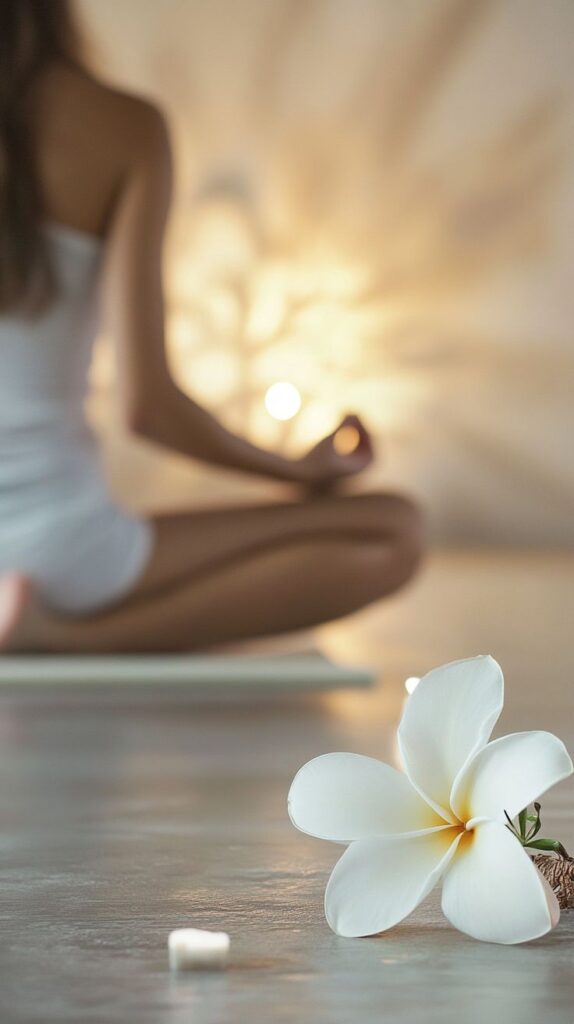
In a fast-paced world driven by speed, multitasking, and constant digital noise, taking a moment to pause and reflect is almost revolutionary. Yet this very pause is essential for holistic well-being. The ancient practices of meditation and self-introspection are more relevant today than ever, serving as transformative tools for self-awareness, emotional balance, and mental clarity.

The True Essence of Meditation:
Meditation is often misunderstood as simply sitting in silence, but it is much more than that. It is the art of being present—of training the mind to focus and redirect thoughts. Whether it involves mindfulness, chanting, breathwork, or visualization, meditation is a powerful tool to quiet mental noise and enter a state of inner clarity.
Understanding Self-Introspection
Self-introspection, on the other hand, is the conscious practice of looking inward-evaluating our thoughts, behaviors, emotions, and values. It is a reflective process, helping us to understand why we think, feel, or act in certain ways. While meditation calms the waters of the mind, introspection dives deep into them, uncovering insights hidden beneath the surface.
Together, these practices help us bridge the gap between who we are and who we aspire to be.

How Meditation Clears Mental Fog
One of the most immediate benefits of meditation is mental clarity. Our minds are often clouded with stress, fear, anxiety, and distractions. Meditation slows down the thought process, enabling us to observe our thoughts without judgment. This non-reactive awareness reduces overthinking, sharpens focus, and enhances decision-making.
Emotional Healing Through Self-Reflection
Self-introspection complements this by helping us understand our emotional patterns. Have you ever reacted strongly to something minor and wondered why? Through introspection, we begin to recognize emotional triggers, unresolved traumas, or limiting beliefs that influence our reactions. This awareness brings emotional maturity and stability, enabling us to respond rather than react.

Science-Backed Benefits of Meditation
The mind and body are intimately connected. Scientific research has shown that meditation reduces stress hormones like cortisol, lowers blood pressure, and improves sleep quality. Regular meditators often report increased energy, reduced chronic pain, and better immune function.
Lifestyle Improvements Through Self-Introspection
When paired with introspection, it helps develop better lifestyle habits. For example, by reflecting on one’s eating patterns or sleep routines, a person can identify harmful behaviors and make healthier choices. Together, these practices foster holistic health—physical, mental, and emotional.

Rediscovering the Inner Voice
Perhaps the most profound effect of meditation and introspection is the strengthening of the relationship with the self. In today’s world, we are so outwardly focused—on our careers, relationships, and social media presence—that we often lose sight of our inner voice. Meditation brings us back to ourselves, to that silent space where the mind rests and the soul speaks.
Introspection then helps decode the language of the soul. It asks important questions: What are my true desires? Am I living authentically? What am I afraid of? These questions may not have immediate answers, but sitting with them plants seeds of transformation.
This inward journey enhances self-awareness, which is the cornerstone of personal growth. A self-aware person is more confident, grounded, and aligned with their purpose.

When we connect deeply with ourselves, we naturally connect better with others. Meditation increases empathy and compassion by enhancing activity in brain regions linked to emotional intelligence. It allows us to pause before we speak, listen without interrupting, and understand others’ perspectives.
Introspection plays a critical role in healing and improving relationships. It allows us to own our faults without shame, recognize the impact of our words and actions, and make conscious efforts to grow. Instead of blaming others, we learn to reflect inwardly and ask: What was my part in this conflict? This shift from external blame to internal awareness fosters mindful and authentic relationships.
A Tool for Spiritual Growth
Beyond health and emotional well-being, both meditation and introspection open doors to spiritual awakening. Spirituality is not necessarily tied to religion—it is the sense of being connected to something greater than oneself. In silence, we realize that we are more than our roles, titles, and identities.
Meditation creates space for spiritual experiences: a sense of unity with all life, a feeling of divine presence, or glimpses of inner peace untouched by the chaos outside. Introspection nurtures humility and surrender, dissolving the ego and allowing one’s higher self to guide the way.
For centuries, saints, sages, and philosophers have turned inward to seek truth. As Rumi said, “The wound is the place where the Light enters you.” Through reflection and stillness, we learn that every challenge is an opportunity to evolve.
Meditation and Introspection in Daily Life
The beauty of these practices lies in their simplicity and accessibility. You don’t need an elaborate setting or years of training. You need just two things: time and willingness.

As these small habits compound, they will slowly reshape your mental landscape.
Misconceptions About Meditation
Many people give up on meditation or introspection because they expect instant results or enlightenment. But like any practice, they require patience and consistency. The mind will wander. Old wounds may surface. Resistance may show up.
This is part of the process. Meditation is not about stopping thoughts but about observing them with detachment. Introspection is not about self-judgment but about self-discovery. Even five minutes a day, done consistently, can bring remarkable changes over time.
In today’s distraction-filled world, meditation and self-introspection act as anchors to your true self. These practices are more than wellness trends; they are courageous acts of self-exploration and healing.
By listening to your inner voice, observing your thoughts, and reflecting on your actions, you unlock a deeper level of peace, purpose, and power. Because the most meaningful journey you’ll ever take is the one within.
1. How long should I meditate daily to see results?
Even 5-10 minutes a day can yield noticeable mental and emotional benefits when practiced consistently.
2. What’s the difference between meditation and self-introspection?
Meditation focuses on calming the mind, while introspection involves evaluating your thoughts and emotions for deeper understanding.
3. Can meditation and introspection help with anxiety?
Yes. Both practices reduce stress and help you manage anxiety by increasing self-awareness and emotional control.
4. Do I need a teacher or app to start meditating?
No. While apps and teachers can help, you can start simply with mindful breathing and a quiet space.
5. How do I stay consistent with these practices?
Set a specific time daily, keep a journal, and treat it as a self-care ritual rather than a chore.
If you liked this article or want to share some information with us then do write us in the comment section below.
Comment below your views. We would love to hear from you. Don’t forget to subscribe to us on our Social Channels to never miss out on any updates from us.
Author – Amit Pradhan
Find the information relevant? Visit our website to know more about such facts.
For an enquiry, write to us at [email protected]
👉 If you liked this article or, then do write us in the comment section below.
For Astrology, Numerology, and Reiki Services contact us today!
We also deal in original quality and Certified Rudraksha, Crystals and Gems.
👉 Shop Now Original Rudraksha & Crystals
For more daily updates do like and Follow Us and keep visiting www.jaymahakaal.com
Copyright © 2025 Jay Mahakaal Centre of Occult Science Pvt Ltd All Rights Reserved